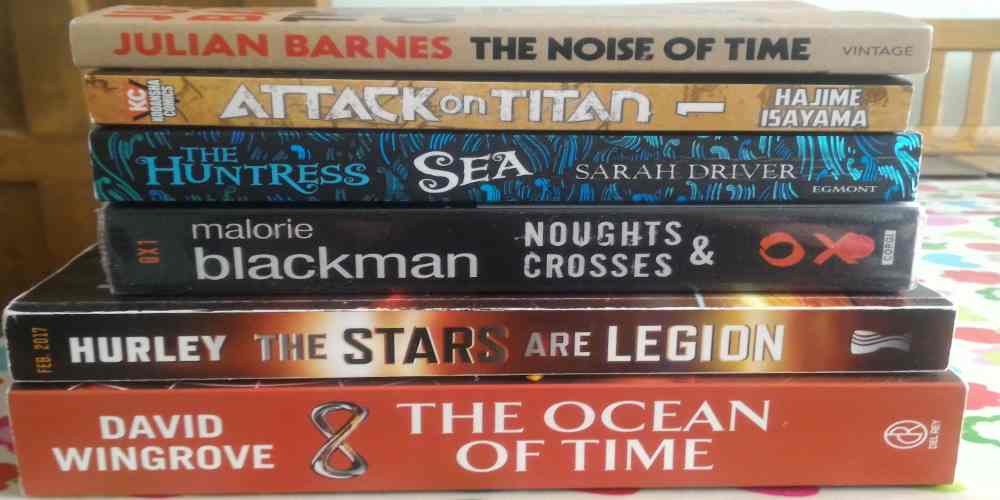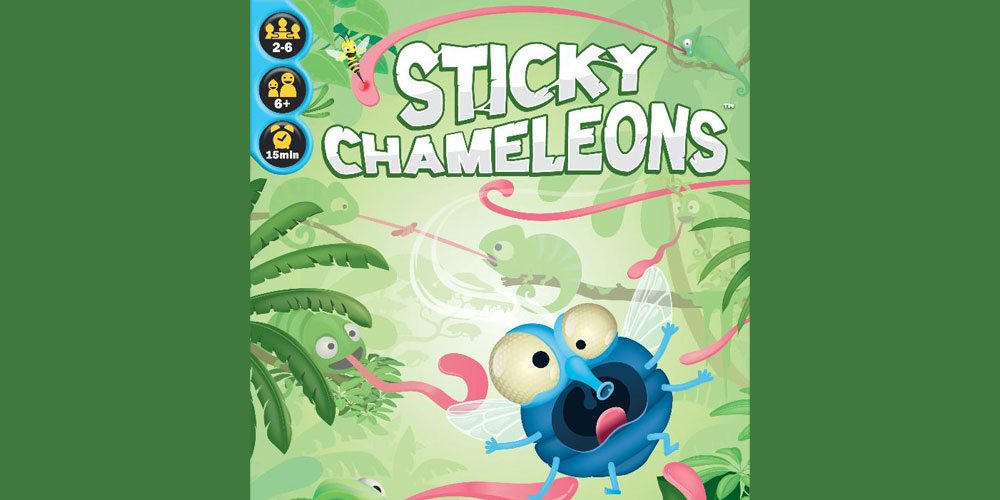
It’s been a bonanza book month here on the paper mountain. I’ve started a new side-project reviewing children’s books to help parents find great reads for their kids. This has showed up both how terrible my web design skills are and how difficult it is to find time to read AND review books.
I’ll probably sum up the children’s books I’ve been reading in a post to themselves, as and when there are enough to do so. In the meantime, here’s where I’ve made my latest camp on the paper mountain.
I’ve already covered two great books this month. The Stars are Legion by Kameron Hurley and The Huntress: Sea by Sarah Driver. These both feature great world-building and very strong female leads and are well worth investigating.
Another favorite of the month was The Ocean of Time by David Wingrove, the second book in the Roads to Moscow series. I’ve fallen foul of a peculiar phenomenon since I started reviewing books, that means I rarely follow-up on a series I like. The number of trilogies I’ve only read two-thirds of is, frankly, a little embarrassing.
I’m not entirely sure why I do this, but I think it’s to do with knowing that final books are usually bankers, and will always be there. As a result, I rarely choose them from the pile. I was an even worse position when my review copy of The Master of Time arrived. I enjoyed the first book, The Empire of Time, yet somehow had never gotten around to following up with even the second book, let alone the third.
Keen to reacquaint myself with the series and this time finish it off, I dove straight into Ocean. The book does not benefit from a long break. Its first chapter is Chapter 154, at the beginning of part 7, and launches straight back into the narrative. It took me a while to sink myself back into Wingrove’s world but I eventually found myself fully immersed and utterly absorbed.
The book has some similarities with my other current book crush, The Fractured Europe sequence (The third installment of which has just won the 2016 BFSA award for best novel.) The Roads to Moscow is a more old-school fiction writing approach. It has none of the taut beauty of Dave Hutchinson’s novels, but it does have compelling storytelling and rich world-building. There is a slow build-up, with a lot of wandering around rural Russia, for no apparent reason. This may annoy some, but I found it set up the final two-thirds of the book perfectly. In many ways, the book reminded me of Neal Stephenson’s Baroque Cycle, although the speed of the Roads to Moscow’s plot is like the Da Vinci Code in comparison.
The latter half of the book is thrilling. I loved the time-travel aspects as central character Otto Behr, moves through time, trying to understand exactly what it is he’s fighting. The story becomes deliciously meta when one of Otto’s counterparts introduces him to Philip K. Dick. At this point the book steps up a gear, being both reverential and playful at the same time.
The book ends on a humdinger of a cliffhanger, that I can’t wait to go back to. I’m not going to wait for months this time though. The next edition of Tales from the Paper Mountain should include a review of The Master of Time.
 Another fine book I read this month is an older book. One considered to be a Young Adult classic in the UK. Noughts and Crosses (Naughts in the US) by Malorie Blackman is nominally a reworked Romeo and Juliet, though only in the sense that it has two teenagers who love each other despite being members of different factions.
Another fine book I read this month is an older book. One considered to be a Young Adult classic in the UK. Noughts and Crosses (Naughts in the US) by Malorie Blackman is nominally a reworked Romeo and Juliet, though only in the sense that it has two teenagers who love each other despite being members of different factions.
Noughts and Crosses is more remarkable for its racial role reversal. The Crosses are black and the Noughts white. The Crosses hold the positions of power and effectively control a striated society. Malorie Blackman, a former children’s laureate, handles this brilliantly. It never feels wrong, forced, overly-simple, or disrespectful to anybody. With her inversion, she neatly shows the trial life can be for those who suffer from racism or prejudice. The book demonstrates the psychological toll of living in a society that considers you deficient.
But a neat literary device, no matter how well it is carried out, does not make a good book on its own. Noughts and Crosses is most definitely a good book. The plot is gentle at the outset, explosive in the middle, and devastating as the story moves towards its conclusion. It’s a pitch-perfect analysis of how good people can do bad things.
My copy of the book had “suitable for older readers” on the outside cover, and this is definitely a warning worth heeding. Whilst much of the book would have been enjoyed by my 11-year-old, there is some content I wouldn’t want him accessing for two or three more years.
Another potential age appropriate faux-pas was avoided by my reading Attack on Titan. This series has a huge following, and the premise intrigued me. I’ve been trying to find books my 8-year-old would like to read, as he often struggles to find novels that engage him. To work around this I’ve been sticking various comic books under his nose, starting with some of the Lego Ninjago comics published by Little, Brown. He loves Ninjago and these have been a huge success.
It was only whilst I was half-way through Attack on Titan that I noticed it had “16+” written on it. I think this age is a little high, but certainly, they would have been unsuitable for my sensitive son.
I’ll be honest Attack on Titan wasn’t really for me. It made me feel old; the literary equivalent of trying to listen to Kendrick Lamar. This book wasn’t for me. Move on grandpa! That said, the ending surprised me, and I can’t help feeling that maybe I should pick up volume two just to see where it goes next.
 In a different corner of the literary universe resides prizewinning, king of letters, Julian Barnes. His most recent novel The Noise of Time was my book group’s choice for this month. I didn’t particularly enjoy reading this short-understated book, mostly I think because of they way it had been packaged.
In a different corner of the literary universe resides prizewinning, king of letters, Julian Barnes. His most recent novel The Noise of Time was my book group’s choice for this month. I didn’t particularly enjoy reading this short-understated book, mostly I think because of they way it had been packaged.
The shadowy figure on the brown paper cover, and the taut blurb with reference to being taken to the “Big House,” screams “espionage novel!” It took me some time to realize that it was nothing of the sort. As The Noise of Time is only 180 pages long, I’d read a significant portion of it looking to take away the wrong things. This raises interesting questions about how we approach texts. Whether our preconceptions influence what we find within.
The Noise Within is definitely a great novel to read for a book group. It’s short, which means everybody should finish, and despite being brief, with spare prose, it generated a huge amount of discussion.
The story is essentially a fictionalized biography of composer Shostakovich. It examines the highs and lows of his career, as fell in and out of favor with the Soviet regime. Many novels of this type deal with the dread of being noticed by Stalin, and disappearing overnight. Whilst this is inevitably present, Barnes focuses on the claustrophobia and exhaustion caused be never being allowed to be oneself. We see the difficulty of being an artist under such conditions. The perils of being feted by a dictatorship, and the risks of giving your creativity free reign in a censored society.
I said at the outset of my book group meeting that “This book would never have been published if it han’t been written by Julian Barnes,” but by the end of the session I had to concede that I was wrong (notwithstanding the fact that publishing is a fickle beast, and even masterpieces may fail to see the light of day.) Whilst the dry tone of the book wasn’t to my taste, through discussion and saying out loud the things I did enjoy about the book, I realized it made more of an impact than I had originally thought.
Above all, The Noise of Time is a book about art. The narrative often comes back to Lenin’s quote that “Art belongs to the people” and how that is at odds with state control. Whilst the novel is on the surface about Stalinist oppression, it isn’t too hard to see that Barnes is also looking at the modern cultural landscape where cost cutting sees the arts massively underfunded. Whilst contemporary western society does not censor art in the same manner as the Soviet Union, the assignment of worth and the “dumbing down” of cultural endeavor is potentially as dangerous. The Noise of Time produces large thoughts for such a small book.
So, that’s it, for this month’s climb.
Next month looks like being a steep ascent with my paper Everest towering ever higher. I’m hoping to read the final book in David Wingrove’s series, The Master of Time and the new book in Robert Jackson Bennett’s “City” series, City of Miracles. My book group choice is the enigmatically titled The Portable Veblen, and I’m also looking forward to AI literary thriller Void Star. Until then, happy reading!
Disclaimer: I was supplied with review copies of all of the books reviewed, except for The Noise of Time.



